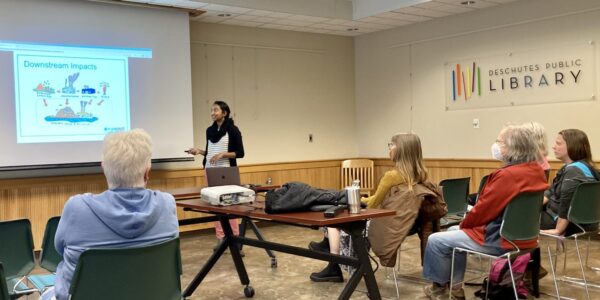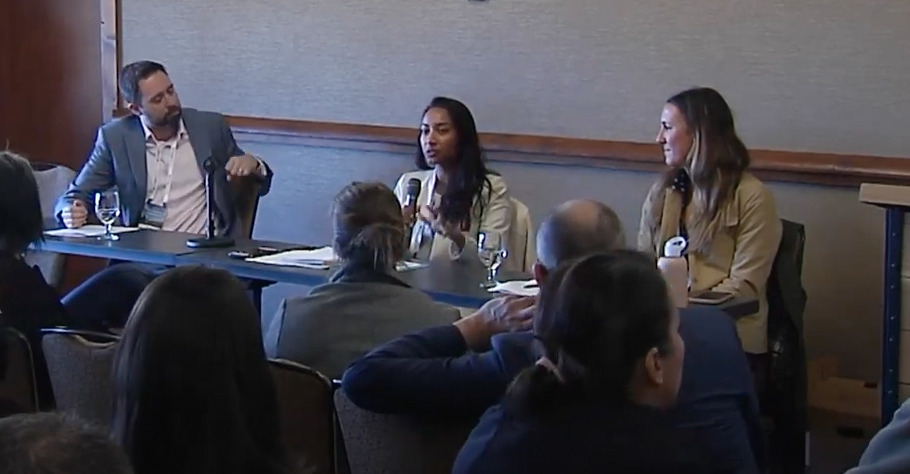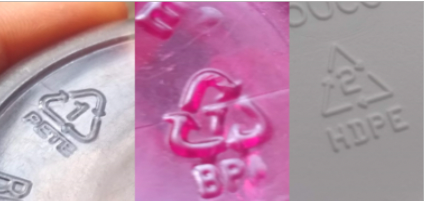Rethink Waste Manager Receives Statewide Recognition

We are proud to announce that our Rethink Waste Project Program Manager, Udara Abeysekera Bickett, has been appointed by the Oregon Department of Environmental Quality to serve on the Rulemaking Advisory Committee to represent the diverse interests of persons and communities likely to be affected by proposed rules in the Plastic Pollution and Recycling Modernization Act of 2021. Congratulations, Udara!
This isn’t the first time Udara has been recognized for her expertise and insight on the ins and outs of recycling and waste here in Oregon. For example, she was recently invited to speak on the topic of food waste in Travel Oregon’s blog series, Traveler’s Guide to Climate Resilience in Oregon: Land.

As part of the Rulemaking Advisory Committee, Udara will speak to a number of issues related to plastic waste, recycling, climate, and equity, which we know to intersect with one another on multiple levels. With her experience and expertise through Rethink Waste, we believe that she is more than capable of bringing an important perspective to the committee.
To learn more, we asked Udara to answer a few questions regarding this news.
Q: What can you tell us about the Recycling Modernization Act?

Udara: The Plastic Pollution and Recycling Modernization Act (RMA) will make updates to Oregon’s recycling system, making recycling easier for the public to use, expand access to recycling services, upgrade the facilities that sort recyclables, and more. Producers of packaging, paper products and food serviceware that sell into Oregon will share the financial responsibility of managing all their “stuff”. One of the updates I am excited about is referred to as “Truth in Labeling.” In my work educating community members about how to recycle right in Deschutes County, I frequently hear about confusion on the “recycling symbol” found on products. The chasing arrows don’t mean that something is recyclable in our community and they don’t mean that something is not recyclable either. That kind of labeling, understandably, leads to confusion, and as result leads to contamination in our recycling stream. I’m looking forward to the labeling guidelines coming out of the RMA that can help eliminate this kind of confusion in our communities.
Q: What issues or topics are you most concerned about when it comes to plastic pollution and waste?
Udara: The role of plastics in the climate crisis is one of my biggest concerns when it comes to plastic pollution. Virtually all plastics are made of fossil fuels. Plastics pollute and produce greenhouse gasses even in the manufacturing stage of their life as these fossil fuels are dug up. As a result, the U.S. plastics industry’s contribution to climate change is on track to exceed that of coal-fired power in this country by 2030. This is why I believe the biggest impact we can have is in Reducing plastics in the first place. That’s not going to happen overnight though, so while we work to curb our reliance on plastics, it is vital that we have effective Recycling systems in place to recycle as much plastic as possible to keep production using virgin plastics at bay.
Q: What do you hope to take away from this experience?
Udara: This is my first time serving on a state-level committee and I am looking forward to learning about the decision making processes. This is also one of the first state-wide laws of its kind covering topics like Statewide Collections List, Truth in Labeling, and Producer Responsibility. I hope that the success of the Oregon RMA can be a model for recycling system updates in other communities as well.
Here is what the DEQ says about this project:
“The Recycling Modernization Act requires producers of packaging, paper products and food service ware to support and expand recycling services in Oregon for their products. This is the first of two anticipated rulemakings related to the Act. For this first rulemaking, DEQ plans to propose rules related to topics including producer responsibility program plan content; DEQ’s administrative fees; the funding and reimbursement of local governments for eligible recycling-related expenses; and the materials suitable for recycling collection in Oregon. DEQ plans to undertake the second rulemaking in 2023.
[…] Members include producers, prospective producer responsibility organizations, local governments, local solid waste service providers, and community-based organizations. DEQ expects to hold the first committee meeting in July.”
To learn more about the advisory committee you can view the rulemaking webpage here.
This appointment is just one example of The Environmental Center’s work advocating for sustainability in our local communities and across Oregon. To learn more about how we advocate for change, visit our advocacy page here.